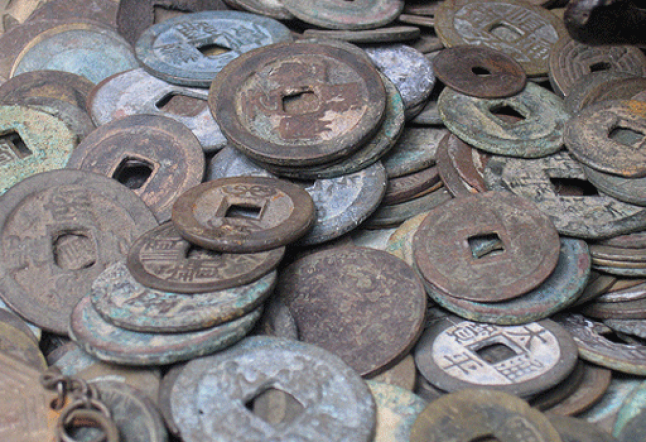uang kepeng: the traditional money of the balinese

You may have noticed old coins with a hole in the middle lying on the ground around the Fuang Kepeng: the traditional money of the balinese front of a house, or appearing in offerings at certain ceremonies, or in works of art, without realizing how important they were to the financing of the arts and the development of a strong traditional local government in Bali.
Chinese money, known generally as Uang Kepeng in Indonesian, or as Pis Bolong in Balinese, is known through the ancient Lontar records to have circulated as a medium of exchange since at least 900 AD, and perhaps much longer. Throughout this time, Uang Kepeng touched on all aspects of Balinese life: cultural, religious, social, political, and economic. Today, Uang Kepeng is used only for ceremonial purposes, while the economic aspects have withered away with the rise of a united Indonesia.
Most Balinese over 35 recall their parents giving them Uang Kepeng to buy lunch and snacks at school. Older adults remember their banjar, the ancient traditional government, imposing fines payable in Uang Kepeng for failure to abide by village rules or attend meetings on time. Some, particularly women, remember using Uang Kepeng to buy nearly all of their families’ daily needs in the marketplace. But regardless of age or gender, every Balinese knows Uang Kepeng is an essential component of Hindu religious ceremony.
Few realize the significant role that Uang Kepeng played in financing the diverse arts in Bali. Although Uang Kepeng circulated freely throughout the island, each banjar levied taxes on the coins, which were used to finance group activities (sekaa) like gamelan or kite flying, or to support community infrastructure projects such as temples, bridges and roads. Women used to control the economy of Bali.
As Miguel Covarrubias wrote, “the women are the financiers that control the market, one seldom sees men in it, except in certain trades or to help carry such a load as a fat pig. Even the money changers are women, who sit behind little tables filled with rolls of small change, Kepeng, Chinese brass coins with a hole in the middle.” Uang Kepeng gave women one of the most important roles in society.
Uang Kepeng also helped protect Balinese culture from the intrusive effects of foreign money, whether through trade or tourism. People could choose to participate in both economies, rather than being forced to choose between them. Take a moment to think about what this would mean to those Balinese who would prefer to continue living a more traditional lifestyle, in harmony with a slower, more sustainable pace of life.
For more info on Bali’s best spots for the modern yogi STAY | SPA | PLAY | EAT | SHOP | YOGA – Download our ULTIMATE BALI GUIDE for free.
Read next >> understanding price discrepancies in bali